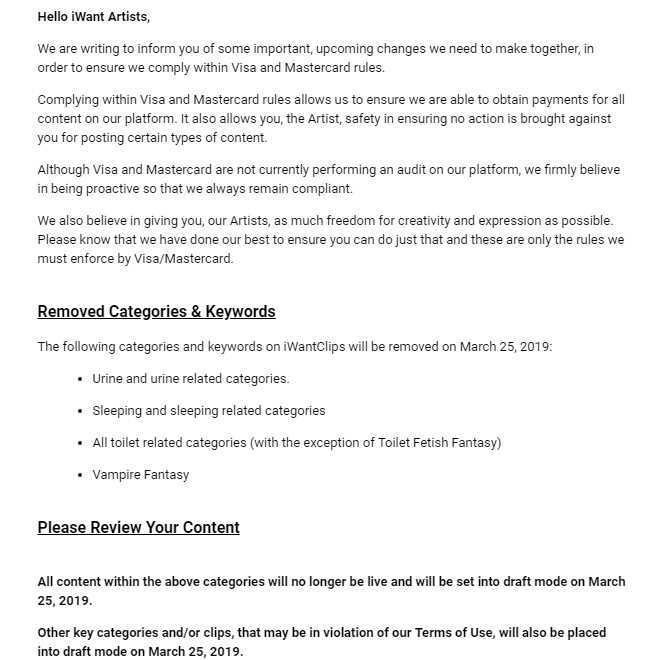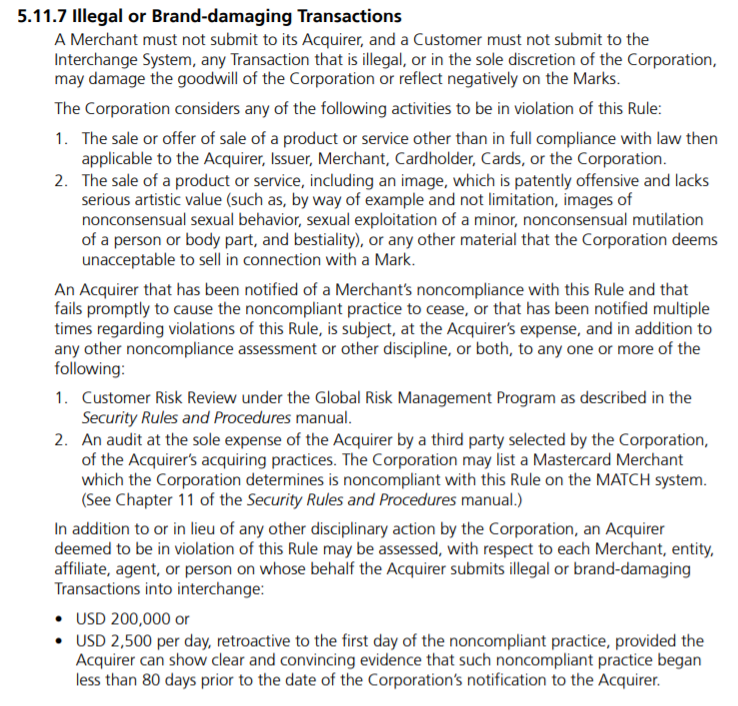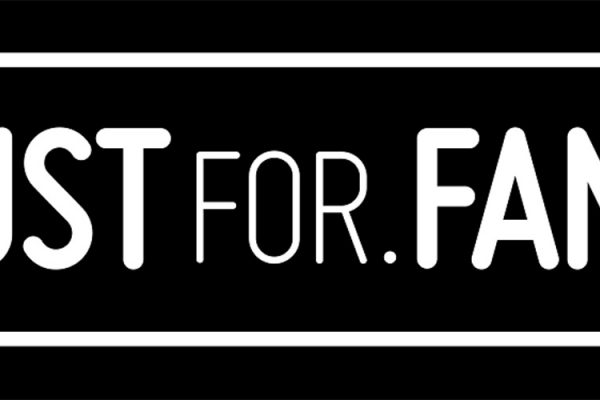Earlier this year, to comply with Visa and Mastercard rules, iWantEmpire (iWE) made changes that affect many content creators who sell on iWantClips (iWC). On March 14, they distributed an email notifying Artists of these changes:

Screengrab by the author.
The email goes on to explain other banned content, words (and words to use instead) and consequences of breaking these rules. iWC’s new censorship algorithm has hit some interesting targets without regard for context. For example:
Although ABO (meaning, alpha beta omega as referred to in Miss Freudian Slit’s tweet below) isn’t currently on iWE’s list of banned words, apparently, it is a banned word. Every time these letters appeared in succession on an iWE site, they were automatically replaced with “BANNED WORD.” This also occurred with content featuring the words “thigh highs,” “grapes,” “reinforce,” “eighteen” and “nineteen.”
so because "ABO" (alpha beta omega) is banned, the word "about" is censored ? @iWantClips https://t.co/CCMXQCYaWn
— MissFreudiaηSlit ??? (@MissFreudian) March 26, 2019
iWE appears to have fixed the problem that censored banned words within words, such as the “teen” in “eighteen,” the “abo” in “about” and the “high” in “thigh.” Still, typing “banned word” into iWC’s video search bar returns more than 130 pages of videos that now have “banned word” in the title or artist name due to this algorithm. This has been a problem since the policy was implemented on March 25. Store owners must manually change the wording to remove the censor.
The current list of banned words can be found on IWE’s forbidden content page, here.
Performers who focus heavily on DDLG and implied incest-themed content took a hit from this, too. Mommy and Daddy are not currently on the list of banned words, but some of this content falls under the rule against incest. iWC clarified that step-relations are acceptable in incest fantasy content. Artists must make it clear that they are portraying fantasies only. iWE went on to explain, “Please note that we believe in giving Artists as much freedom for creativity and expression as possible. Please know that we do our best to ensure Artists can do just that and these are only the rules we must enforce by Visa/Mastercard.”
Reading alot of comments on my feed about a company changing rules of what can be uploaded. Models please understand it is a payment processor issue not the company. They must follow the rules if they dont want to be shut down. Its like being mad at the stove for being hot.
— Cute But Psycho (@LadyBellaKush) March 18, 2019
Policies like this are not uncommon in the online porn world.
Earlier this year, YNOT Cam discussed payment processing issues that hold cam sites like Chaturbate to certain content rules – check out “Humans Cry, But Are Models ‘Allowed’ to Cry on Cam?” Here are Chaturbate’s terms, which prohibit performing while intoxicated, references to sex with animals or minors, blood, violence, and other things. MyFreeCams also forbids similar content.
Take some time to browse the content rules on each site you work on. You will see many of the same words and acts are against the rules across the board. Rules against beastiality, pedophilia, rape and mutilation are pretty standard. Additionally, some sites also prohibit content that includes, for example, blood in any capacity, asphyxiation, fisting, incest or references to “illegal” sex work. Pornhub has a long list of banned words for selling videos. So do ManyVids and Clips4Sale. Links to other adult sites’ content restrictions can be found at the end of this article.
What does a payment processing professional have to say?
There are numerous factors determining what these sites do and do not allow contractors to post. We talked to Cathy Beardsley, CEO of Segpay, about the heavy influence global payment processors have on cam and clip sites’ rules and regulations. Segpay is a digital payment processor utilized by many cam sites such as ImLive, Camsoda, BongaCams, Stripchat and Cam4.
Consider the most recent list of banned words on Clips4Sale, updated last year. Notice that it clarifies “Per MC/Visa policy…” Financial corporations like Visa and Mastercard (MC) can sever partnerships with these sites if they violate the parent company’s guidelines. This is why Visa and MC have such a strong hold over popular adult sites and what is and is not permitted.
According to Beardsley, “Most adult sites market their products and services in regions where Visa and Mastercard are the most prominent payment options available. If a merchant [the adult website] wishes to accept Visa and Mastercard, they must comply with the card brand regulations. These include compliance programs with policies regarding merchant registration, reporting, fraud, allowable chargeback thresholds, prohibited content, etc.”
The sites we work on are also subject to penalties if they don’t comply with the card brand’s set regulations. Visa and Mastercard process payments between merchants who accept Visa and MC — such as cam and clip sites — and the banks of the Visa and MC cardholders. If the sites chose not to accept Visa- and MC-branded payments, they might be able to avoid restrictive content rules to stay compliant… but they wouldn’t be able to accept funds from Visa or MC cardholders, which would take away a huge number of potential customers.
While these corporations allow adult sites to process payments this way, hosting content such as fisting, weapons, rape themes and certain bodily fluids can get these sites into trouble with the companies that handle the money. Put simply, whoever has the gold makes the rules.
Mastercard’s merchant rules include a section that prohibits illegal and “brand-damaging” transactions:

Screengrab by the author.
Based on MC’s rules, it’s logical for adult sites to ban real or implied bestiality, references to illegal acts, drugs and implications of non-consent (eg, rape or intoxication). But why do they ban things like asphyxiation, blood, urine/“golden showers,” fisting and vampire or alien fantasies? Well, perhaps these things are just so unwholesome, MC considers them brand-damaging.
Beardsley elaborated, “The card brands’ compliance programs are designed to protect their brands from legal and reputational risk. They do not want to be associated with illegal or what they consider to be brand-damaging activities. The specific items that you list” — asphyxiation, blood, urine, fisting, vampires, aliens — “are typically the policies of the payment provider or the acquiring bank, and their own risk tolerance based on past experience and a reasonable analysis of the brand regulations. For example, even though ‘drunk, passed out, asleep’ are not specifically addressed in the brand programs, they do prohibit nonconsensual sexual activities. If someone is drunk, passed out or asleep, they cannot provide consent, and therefore it is considered a violation of the program.”
This speaks to why some sites are strict in their allowance of certain fantasies. For example, iWantEmpire forbids the use of the words “mind control” and “hypnotize” because, if you are hypnotized or otherwise not in control of your own mind, you cannot consent. This violates the MC compliance policy. iWE allows Artists to skirt this rule by instead using the word “mesmerize.”
It’s the billing companies, not the sites 🙁
— AmateurPorn.com (@AmtrPorn) April 20, 2018
Working in a “high risk” industry makes it harder for us to earn and keep our profits. Adult content creators work as independent contractors. They stream and host content on adult platforms, and the platforms take a percentage of their earnings.
Some sites take more than others, but the average is 50-50. A buyer pays 100 percent. The model gets 50 percent of that, and the site gets the other 50 percent. The site uses their cut to pay for its own projects, staff members and other contractors — the administrators, social media managers, support agents, designers, tech team and a variety of other costs. They also have to pay the processing companies, which charge fees to handle this large volume of transactions.
Since adult performers are “high risk,” these fees tend to be higher. But, why are we labeled high-risk? Beardsley says it’s because adult sites exist in a card-not-present environment. Our business is conducted digitally. All a buyer has to do is input legit card info when purchasing content, tokens or tipping. This “can lead to problems with verifying cardholders and result in invariably higher fraud and chargeback rates relative to card-present environments. Legal, regulatory and reputational risk associated with the industry are other reasons it can sometimes be challenging to find acquiring partners,” Beardsley explained.
Visa and Mastercard will do business with compliant adult sites as long as certain rules are followed to prevent law-breaking and “brand-damaging” transactions. So, it’s not your cam and clip sites’ fault that you’re not allowed to do things like cry, show (or even discuss) menstrual blood, step on fish eggs, smoke, drink, flog, blackmail or advertise full-service sex work on their platforms.
Be informed! Here are links to many adult sites’ content restrictions:
For AmateurPorn’s content rules, click here and scroll to “content restrictions.”
For Clips4Sale’s content rules, click here and scroll halfway down.
For iWantEmpire’s content rules, click here. For iWantEmpire’s banned words, click here.
For ManyVids’ content rules, click here, and expand “upload rules.”
For OnlyFans’ content rules, click here and scroll to section 10.2.
For Pornhub’s content rules, click here and scroll to “prohibited uses.” For Pornhub and Modelhub’s rules for selling content, click here.
For SextPanther’s model rules, click here and scroll to section 8.
For BongaCams’ model rules, click here and scroll to the 8th clause.
For Cam4’s model rules, click here.
For CamSoda’s model rules, click here and scroll to the bottom.
For Chaturbate’s model rules, click here and scroll to section 5.
For ImLive’s model rules, click here and scroll to section 5-g.
For MyFreeCams’ model rules, click here.
For Streamate’s model rules, click here.
For Stripchat’s model rules, click here.
—
Alsanna James is a student, advocate, spoonie, writer, gamer and adult content creator. Half silent oracle, half professional sexpot, you can email her at alsanna@ynotcam.com and find her on Twitter at @AlsannaJames.
Header image by Negative Space via Pexels.











[…] YNOT took a detailed look into content the major credit card brands deem acceptable (or not) for sites taking online payments, and how merchants often must balance free expression with the necessity of getting paid for their work. Segpay CEO Cathy Beardsley was interviewed for the piece and provided insight from the payment processor’s point of view: […]
[…] Read the full article by Alsanna James at YNOTCam.com […]
[…] a high-risk industry like ours, payment processors like Visa and Mastercard make it hard to tiptoe around their regulations just to get paid. But PayPal, too, has made their […]
[…] although it does not specify any site rules, which should be included on sites like these because payment processors have rigid guidelines in place when doing payouts for adult businesses. From my member account, I […]
[…] sell a lot of my content, we have been running a list forever of what we aren’t allowed to post, a list generated by Visa/Mastercard. I can’t, for example use words like “coerce,” “intoxicate,” or “force.” Now that […]
[…] complies with applicable laws, as well as the regulations imposed by payment processors. See “Visa’s, Mastercard’s Hold Over Adult Content Creation” for more discussion of this […]
[…] complies with applicable laws, as well as the regulations imposed by payment processors. See “Visa’s, Mastercard’s Hold Over Adult Content Creation” for more discussion of this […]
[…] YNOT took a detailed look into content the major credit card brands deem acceptable (or not) for sites taking online payments, and how merchants often must balance free expression with the necessity of getting paid for their work. Segpay CEO Cathy Beardsley was interviewed for the piece and provided insight from the payment processor’s point of view: […]
[…] YNOT took a detailed look into content the major credit card brands deem acceptable (or not) for sites taking online payments, and how merchants often must balance free expression with the necessity of getting paid for their work. Segpay CEO Cathy Beardsley was interviewed for the piece and provided insight from the payment processor’s point of view: […]
[…] YNOT took a detailed look into content the major credit card brands deem acceptable (or not) for sites taking online payments, and how merchants often must balance free expression with the necessity of getting paid for their work. Segpay CEO Cathy Beardsley was interviewed for the piece and provided insight from the payment processor’s point of view: […]